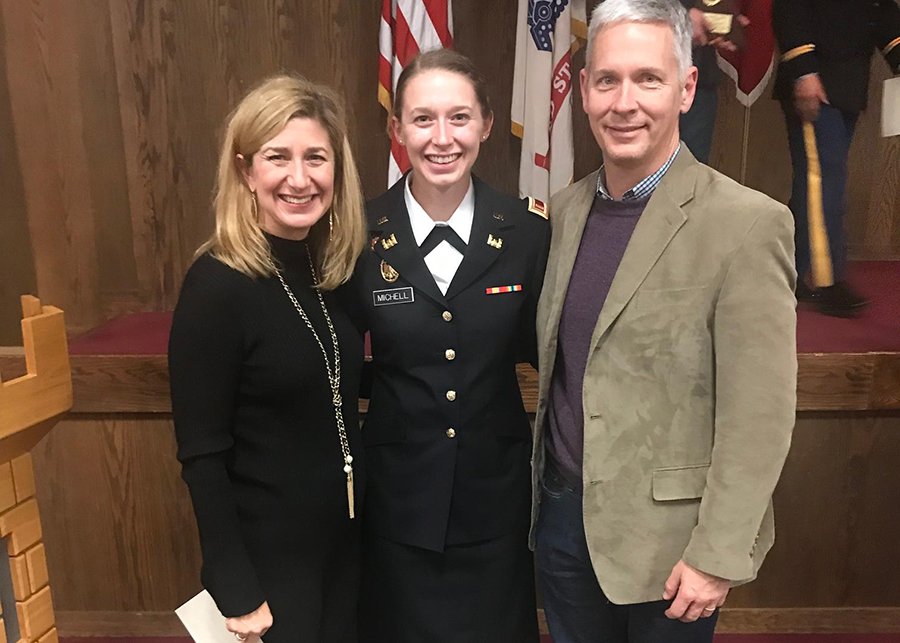
By Alicia Wanek
What if your child decides to join the military right after high school instead of pursuing a college education? Or perhaps they wish to attend a military academy? Alternatively, they might appreciate the military’s support in funding their college tuition. While each situation is unique, the emotional journey for parents remains strikingly similar. Balancing concerns for their child’s safety against pride in their willingness to serve leads military parents to navigate a complex emotional landscape.
A Personal Journey of Military Families
For David and Terry Nash, the prospect of one or more of their five sons joining the military was always a possibility. David enlisted at seventeen and dedicated two decades to the U.S. Army, with Terry at his side for much of that time. After retirement, David took on the role of a JROTC instructor at Grand Prairie High School. Ultimately, two of their sons chose military service; their eldest, Stephen, is based at Ft. Jackson, SC, while the youngest, James, is stationed at Ft. Stewart, GA.
David possesses a valuable perspective as a former military recruiter and a JROTC instructor. He frequently guides high school students interested in military careers. “I encourage my students, if they’re capable, to go to college and explore military options,” David explains. University ROTC programs allow students to prepare for military service while working towards their degree. For others, enlisting represents a more suitable path. “In my experience, I’ve seen graduates struggle to get ahead. The military can help them find their way,” David asserts.
Benefits of Enlisting
A significant advantage of enlisting in the military is the opportunity to utilize the GI Bill for college education. David and Terry’s eldest son has taken advantage of this benefit. While serving in the Army, he has earned his bachelor’s degree and is currently pursuing a master’s in Healthcare Administration. With just four years left until retirement, he will be debt-free and well-equipped for his civilian future.
Parental Perspectives on Military Service
Terry feels her long exposure to the military lessened her worries about her sons’ decisions to enlist. “I was used to the environment,” she remarks. In contrast, Liz Burton experienced a greater hesitation. Her son Blake enlisted in the Marines at eighteen after secretly communicating with a local recruiter throughout his senior year while Liz and her husband were occupied at a soccer tournament with a younger child. “We weren’t on board at first,” Liz confesses, as she and her husband, a physician in McKinney, had anticipated that Blake would attend college.
In the two years since joining the Marines, Liz acknowledges, “There have been ups and downs,” but she ultimately concludes, “I think it’s been good for him.” Blake is now stationed in Oahu, Hawaii, recently returning from a six-month deployment in Okinawa, Japan. He explained to his parents that he chose the Marines and an Infantry unit for their challenge and toughness, saying, “If I’m going to do it, I’m going full force.” Reflecting on Blake’s childhood interests in military toys and documentaries, Liz wonders if he felt pressure to enlist too soon, suggesting he might have benefited from waiting a year after graduation before committing. “Four years is a long time to give back,” she points out.
Blake is mindful of the commitment he has made, and Liz shares that he has never voiced any complaints about his service. Jeri Chambers emphasizes that the choice to enlist in the military needs to come solely from the individual, as the demands can be daunting, and any coercion can lead to resentment.
Jeri and her husband, Rick, have a daughter named Taylor who graduated from the United States Military Academy at West Point last year, and their son Austin just completed his freshman year there as well. Austin, like Blake, played “Army” as a child and voluntarily read The Art of War as a teenager, participating in Scouts and sports, which made military service seem like a natural progression. Taylor approached her parents after her sophomore year, expressing her desire to attend a university that challenged her both physically and academically. After discovering that West Point was the only military academy offering chemical engineering, she pursued admission wholeheartedly, serving as an inspiration for Austin.
Growing Up Through Military Service
Families report that military service has prompted their children to embrace responsibility and face challenges that accelerate their transition into adulthood. Jeri advises parents with children in military service to prepare for their children’s maturation. Taylor humorously states she felt five years older for each year spent at West Point. Liz shares that when she met Blake after his basic training, she thought, “He left as a boy but returned as a man.” David notes, “The military isn’t for everyone. I view it as a place for personal growth.”
Each family underscores the importance of discussing the realities of military commitment with their children. Terry recommends participating in meetings with recruiters, allowing parents to gain firsthand insight alongside their children. Jeri recalls simply asking her kids, “Are you sure this is what you want to do?”
Once the decision to serve is made, anxiety can set in. Liz admits, “I keep my phone on all the time. I never know what type of call I may receive.” Terry acknowledges the understanding that deployment is a genuine possibility, while Jeri shares that she now prays every time the phone rings.
Pride in Service
Despite the challenges, these families share a profound pride in their children’s choice to serve. Liz expresses, “I’ve developed a new sense of patriotism. We support him and continually express our pride in the sacrifices he’s making.” Ultimately, as a nation, we can all take pride in every soldier, sailor, or Marine who has pledged to protect us.






